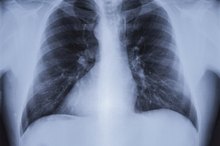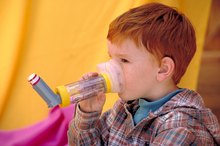What does fact checked mean?
At Healthfully, we strive to deliver objective content that is accurate and up-to-date. Our team periodically reviews articles in order to ensure content quality. The sources cited below consist of evidence from peer-reviewed journals, prominent medical organizations, academic associations, and government data.
- Mayo Clinic: Budenoside (Inhalation Route)
- Mayo Clinic: Bronchodilator, Adrenergic (Inhalation Route)
- U.S. National Library of Medicine DailyMed
The information contained on this site is for informational purposes only, and should not be used as a substitute for the advice of a professional health care provider. Please check with the appropriate physician regarding health questions and concerns. Although we strive to deliver accurate and up-to-date information, no guarantee to that effect is made.
What is the Difference Between Albuterol & Pulmicort?
Albuterol is a generic inhalant medication, and Pulmicort is a brand name for the prescription inhalant medication budenoside. Despite the fact doctors prescribe both Albuterol and Pulmicort for asthmatics, these drugs have distinctly different purposes.
If you are experiencing serious medical symptoms, seek emergency treatment immediately.
Purpose
Asthmatics use Albuterol inhalants to relieve asthma attacks or sudden, severe flare-ups of breathlessness and wheezing. Pulmicort inhalers decrease the frequency of asthma attacks, but cannot stop an asthma attack once it starts.
Function
How Do I Mix Prednisone With Tylenol?
Learn More
As a beta-2 agonist medication, Albuterol causes your airways to dilate or widen as the medication fills your lungs. The corticosteroid Pulmicort suppresses the actions of your immune system, decreasing inflammation in your airways.
Time Frame
Doctors prescribe Albuterol for use as needed, and one dose of the drug takes effect in only a few minutes, explains the Mayo Clinic. Pulmicort is a daily medication and requires several days to weeks of consistent use before reaching its effectiveness.
Risks
List of Nebulizer Medications and Ingredients
Learn More
Albuterol poses a risk for changes in heart rate and increases in blood pressure. Since it suppresses the immune system, Pulmicort may make you more susceptible to bacterial and viral infections, warns the U.S. National Library of Medicine 3.
Considerations
If you have a history of heart disease, hypertension, hyperthyroidism or pheochromocytoma, it may not be safe for you to take Albuterol. Doctors use Pulmicort with caution in patients with osteoporosis, cataracts, glaucoma, measles, tuberculosis or milk protein allergies, explains the Mayo Clinic.
Related Articles
References
- Mayo Clinic: Budenoside (Inhalation Route)
- Mayo Clinic: Bronchodilator, Adrenergic (Inhalation Route)
- U.S. National Library of Medicine DailyMed
- AstraZeneca. Pulmicort Flexhaler 90 mcg 180 mcg (budesonide inhalation powder). Updated April 2010.
- Muneswarao J, Hassali MA, Ibrahim B, et al. It is time to change the way we manage mild asthma: an update in GINA 2019. Respir Res. 2019;20:183. doi:10.1186/s12931-019-1159-y
- AstraZeneca. Symbicort (budesonide and formoterol fumarate dihydrate) Inhalation Aerosol, for oral inhalation use. Updated 2017.
- Falk NP, Hughes SW. Medications for chronic asthma. Am Fam Physician. 2016 Sep;94(6):454-62.
- Tashkin DP, Lipworth B, Brattsand R. Benefit:risk profile of budesonide in obstructive airway disease. Drugs. 2019;79(16):1757-75. doi:10.1007/s40265-019-01198-7
- Paparoupa M, Linnemüller S, Schuppert F. Off-label use of budesonide suspensions to treat a patient with lymphocytic esophagitis. Z Gastroenterol. 2017;55(11):1127-30. doi:10.1055/s-0043-117187
- Sachanandani NS, Piccirillo JF, Kramper MA, Thawley SE, Vlahiotis A. The effect of nasally administered budesonide respules on adrenal cortex function in patients with chronic rhinosinusitis. Arch Otolaryngol Head Neck Surg. 2009;135(3):303-7. doi:10.1001/archoto.2008.555
- American Academy of Allergy, Asthma & Immunology. Inhaled asthma medications. Updated 2020.
- Liang TZ, Chao JH. Inhaled corticosteroids. In: StatPearls. Updated February 10, 2020.
- AstraZeneca. Pulmicort Respules (budesonide inhalation suspension) 0.25 mg, 0.5 mg, and 1 mg. Updated 2009.
- Rance K, O'Laughlen MC. Managing asthma during pregnancy. J Am Assoc Nurse Pract. 2013;25(10):513-21. doi:10.1002/2327-6924.12052
- Sharma PK, Gupta N, Hasan N, Krishnamurthy B, Singh S. Hypersensitivity with inhalational budesonide: An under recognised entity. J Clin Diagn Res. 2016;10(10):FD01-02. doi:10.7860/JCDR/2016/22209.8737
- Kwon JW, Go TH, Han SS, et al. Inhaled corticosteroid related pneumonia in real world among the patients with asthma and COPD. Eur Respir J. 2017;50:PA3544. doi:10.1183/1393003.congress-2017.PA3544
- Zanger UM, Schwab M. Cytochrome P450 enzymes in drug metabolism: regulation of gene expression, enzyme activities, and impact of genetic variation. Pharmacol Ther. 2013;138(1):103-41. doi:10.1016/j.pharmthera.2012.12.007
- Barnes CB, Ulrik CS. Asthma and adherence to inhaled corticosteroids: current status and future perspectives. Respiratory Care. 2014;60(3):455-468. doi:10.4187/respcare.03200
Writer Bio
Faith Davies has been writing professionally since 1996, contributing to various websites. She holds an LAH insurance license in the state of Pennsylvania and has experience as a bank branch manager and lending officer. Davies graduated cum laude from the University of Pittsburgh with a Bachelor of Arts in art history.








